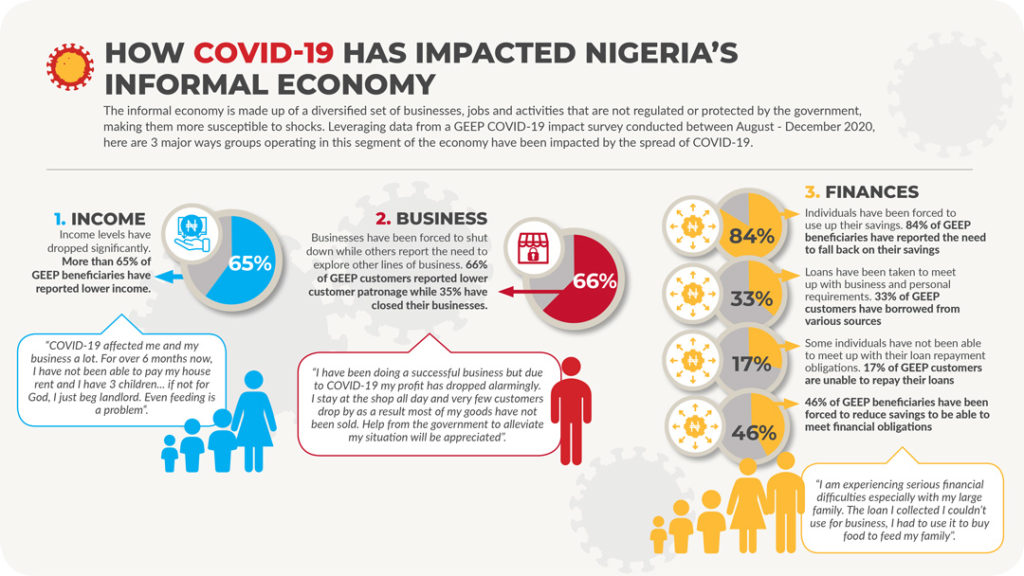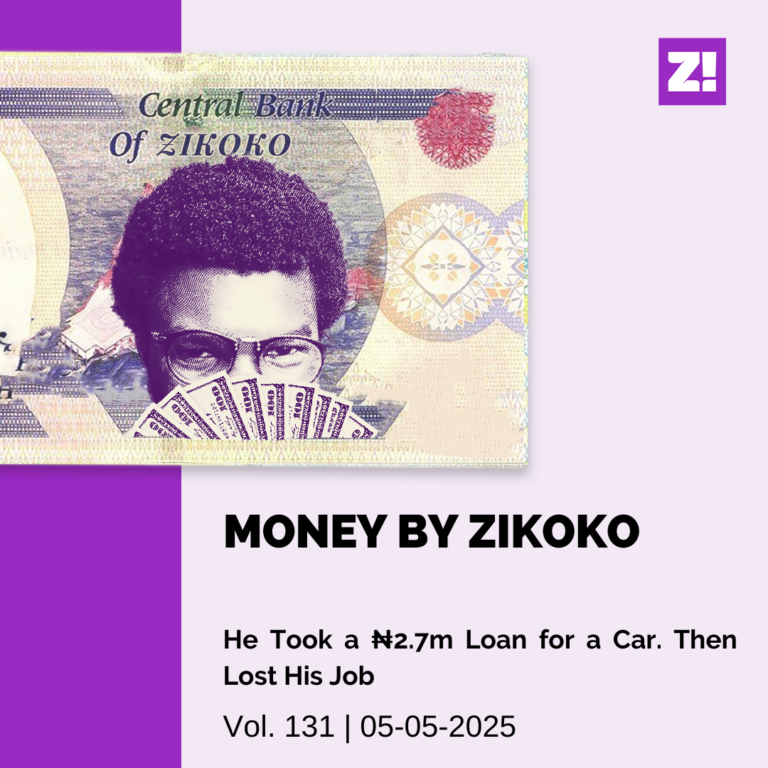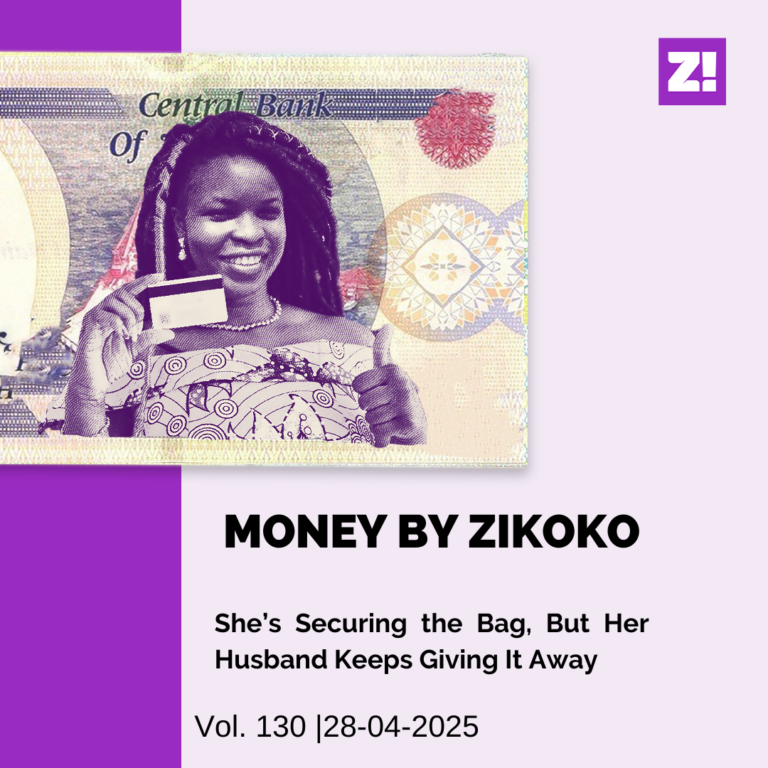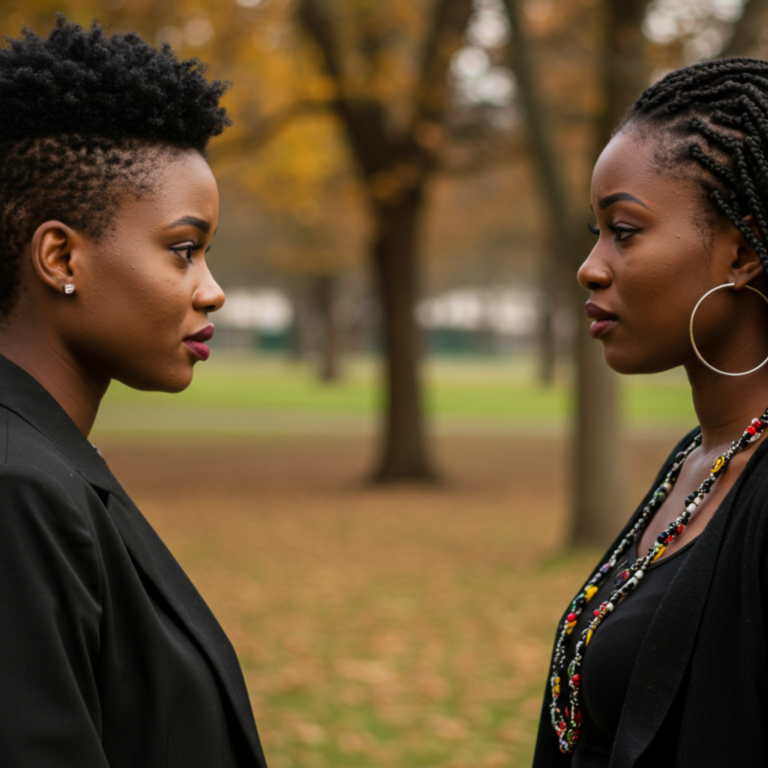Since August 2020, Nigeria’s Government Enterprise and Empowerment Program (GEEP) and 60 decibels with the support of the Rockefeller Foundation have been administering a survey to GEEP clients to understand how COVID-10 impacted their personal and economic situation. An interim report has been published, and it shows that the Nigerian informal sector was adversely affected by the outbreak. 9 out of 10 GEEP clients recorded drops in their income levels, businesses struggled to stay afloat due to government-imposed closures, low footfalls and constrained supply chains. To survive, GEEP clients had to rely on their savings, borrowed heavily and reduced percentages set aside for household and business savings or stopped outrightly. The data also showed that 35% of GEEP respondents had to close down their businesses, 66% recorded fewer customers and 84% have been using their savings to cope with current hardships. We decided to examine how everyday Nigerians, particularly small business owners were affected by the pandemic. One story every week for the next six weeks.
The subject of this story sells tomato and other items at a market in Abuja. She talks to us about how she’s been building her business over the years and how the pandemic and a market dispute are making things a little more difficult for her.
Do you remember when you started your business?
I started this business when my husband passed away in 2005. After his funeral in our hometown, I returned to Abuja, and my people said that it was good for me to start something. They gathered themselves together and gave me ₦15k, and that was my capital. I started selling tomato and pepper. Later I added onion and ginger. I couldn’t afford a shop, so I sold in an open space. I’d put my goods on the ground and sell.
The market was moving. Then the government said we should leave the place in 2009.
Why?
They said it was illegal for us to sell there. Like that, I didn’t have a job anymore.
What did you do after?
Someone helped me to look for a job, and I started working as a house help for a woman. I was paid ₦30k every month.
How long did you stay at this job?
About a year. I started looking for another market to continue selling my goods. I still couldn’t afford a shop — a year’s rent was ₦75k if you got it directly from Urban Centre. But some people get shops from Urban centre and give them out to rent. Those ones usually want ₦120-₦130k per year. I couldn’t afford either, so I went for something else.
What was that?
Ground space, although I had to pay for it too. They were measured by portions, and I rented two portions at ₦40,100 per year.
Oh wow. How much did you start with this time?
I’d saved ₦97k from my previous job. After renting my space and settling the agents, what remained wasn’t enough to buy goods. I went to a friend and borrowed ₦100k. She asked me not to pay interest on it and take care of my business first before returning the money to her.
I managed for the first three months. When I started making some sales, I started putting ₦200 and ₦500 into a daily contribution programme. After a year, I had ₦132k. I returned ₦80k to my friend, and she didn’t even complain. I used what was left to stock up, and I continued the daily money contribution. This is what I’ve been doing since that time.
At the time, how much money were you making every month?
I was making about ₦6k profit per week. Sometimes, it was as low as ₦4k. It wasn’t a lot, but it was something.
What was life like for you during this time?
I was making enough to train my five children — four boys and a girl. Two of the boys have graduated now. My daughter has just finished her OND. My last boy has finished his secondary school education and is currently learning graphic design.
They are good children. When I was going through a hard time finding work, they were understanding. They managed whatever I provided. Also, my husband’s community always sent bags of rice, foodstuff and money during Easter and Christmas. I also joined some small-small NGOs to ease the burden. One of them paid two of my children’s school fees when they were in secondary school and bought books for them.
That must have been a huge relief. What about other things like rent?
Hmm. After my husband died, his elder brother threw us out of the house. He said I was the one that killed his brother. It was a big problem.
Our people reported the case to the minister of the FCT at the time, and he took it up. He promised to help. One day, I got a call from his people to go to FCDA in Abuja. They gave me a form to fill and asked me to write what I needed from the minister. Not long after, they gave me a 2-bedroom flat for free. They did the same thing for 29 other widows. This was 2007.
Wow.
But the place was very far from the market, so I put it up for rent — ₦150k per year. I’m living in a single room apartment in a government quarter now, and I’m paying ₦80k there. I pay my rent with the money I get from the house. The only problem is the tenants. There was a man who stayed there for over three years and didn’t pay. Before I knew it, he ran out. There have been other people like that. I just got a new tenant last year, and I hope they won’t be like the others.
Hopefully. How was 2020 for you?
It started out okay. February and March were good.
When the lockdown was announced, people rushed to the market to buy things. And everything crashed after that. Many people in the private sector were affected and lost their jobs, and this affected sales a lot.
I couldn’t afford to do my daily money contribution anymore. And I tried to. Things didn’t change after the lockdown because customers were afraid to come to the market because of the crowd.

What did this mean for you?
I would have goods sometimes and customers wouldn’t come. The ones who came would complain a lot before they bought whatever they had the means to buy. Sales reduced, and it was a struggle to even get the capital back. Let’s not talk about profit.
Things are better now than they were last year. I started putting ₦200 in my daily contribution at the beginning of this year, and I should be able to continue doing that for the rest of the year. But there’s a new problem now.
What’s that?
The sellers who have shops in the market gathered themselves and announced that those of us without shops should stop selling onions, Irish potatoes, water yams, dry fish, and some other food items. They said it isn’t fair that we didn’t pay what they did for their shops, but we’re selling the same thing they sell. I used to sell onions and Irish potatoes. Now, I can only sell tomatoes and pepper.
This is a problem because onions and Irish potatoes sell very fast. I finish selling a bag of potatoes in less than five days and get about ₦4k in profit. A bag of onions finishes in a week and brings ₦3k-₦4k in profit. I’m losing about ₦7k in profit every week now. I used to have more gain on tomatoes, but everyone is selling them now, so I don’t see a lot of profit anymore — maybe ₦1500 every week if I’m lucky.
Ah.
There’s no point going to the market every time anymore since I can’t sell the things that sell fast and bring me a better profit. I’m just managing my life. Wetin I go do?
Do you think access to credit facilities, like loans, will make it easier for you to rent a shop and buy more goods?
I don’t like loans because of the interest. They are too stressful. I’m almost 60 years now, and I don’t want anything that will be disturbing my peace of mind. If I see one that has the right conditions, and I know how to pay it back, I might consider it. But I haven’t seen one, so I will continue to manage. If I need money, I go to my friend and borrow it from her.
With the issue with shop owners, how do you think the coming months will play out?
I hope things will be better. The Covid scare is coming down. The only issue that could affect my business now is the insecurity in the North. These bandits are attacking farmers here and there.
I also hope that I have more money to put into my business. If I have enough capital, I can get a shop. But there’s a problem there. I hear that they will be selling some shops for ₦1.7m starting from June. How can I afford that? I don’t know what will happen, but I’ve decided to put my faith in God.
Editor’s note: This interview has been edited for clarity.




